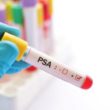The role of free PSA in the detection of clinically significant and fatal prostate cancer
The study aimed to determine if incorporating percent-free PSA alongside total PSA could enhance the prediction of clinically significant and fatal prostate cancer risks. Researchers analyzed data from 6,727 men enrolled in the Nationally funded NIH Prostate, Lung, Ovarian, and Colorectal Cancer Screening Trial. Among them, 475 were diagnosed with clinically significant prostate cancer, and 98 experienced fatal prostate cancer during a median follow-up of 19.7 years.
Key findings showed that men with higher baseline PSA levels (≥2 ng/mL) and lower percent free PSA (≤10%) had higher cumulative incidences of fatal prostate cancer over 15 to 25 years follow-up compared to those with higher percent free PSA (>25%). Specifically, the cumulative incidence was 3.2% to 6.1% for men with lower percent free PSA versus 0.03% to 1.1% for those with higher percent free PSA.
In younger men (aged 55-64 years) with baseline PSA between 2- 10 ng/mL, adding percent free PSA improved the predictive ability for both clinically significant prostate cancer (from 0.56 to 0.60) and fatal prostate cancer (from 0.53 to 0.64). Similarly, in older men (aged 65-74 years), the predictive ability for clinically significant prostate cancer improved from 0.60 to 0.66 but not for fatal prostate cancer.
After adjusting for age, digital rectal exam results, family history of prostate cancer, and total PSA levels, a lower percent free PSA was associated with an increased risk of clinically significant prostate cancer.
In conclusion, the study supports the use of percent free PSA alongside total PSA to better assess the risk of clinically significant and fatal prostate cancer.
J Urol. 2023 Oct;210(4):630-638. doi: 10.1097/JU.0000000000003603. Epub 2023 Jun 29.



















